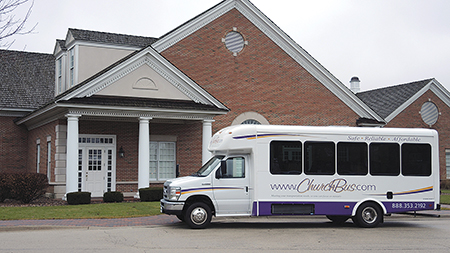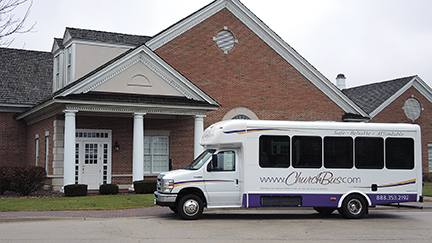
By Mike Jones
![]() If you’re in the market for a church bus, you really need to think about what happens “down the road” — i.e., in terms of maintenance.
If you’re in the market for a church bus, you really need to think about what happens “down the road” — i.e., in terms of maintenance.
Here are six questions you should ask before you buy, and some expert advice.
#1: How do the long-term maintenance considerations differ if my church buys a used bus instead of a new bus?
One of several advantages to a new bus is that maintenance costs are predictable, for the most part. Regular tire rotations, oil changes, brake pads and alignment are inexpensive and can easily be figured into a budget.
 A used bus, on the other hand, is unpredictable. Equipment failures can’t be scheduled.
A used bus, on the other hand, is unpredictable. Equipment failures can’t be scheduled.
For both new and used vehicles, the costs associated with routine maintenance are about $500 to $700 (based on 12,000 miles) per year. However, the cost of repairs due to parts failure on a used bus can easily reach $1,500 to $1,800 per year or more — engine, transmission, A/C system, suspension, brake rotors and calipers, etc.
When purchasing a used bus, what might seem like savings and good stewardship on the front end can actually end up costing your church more money in the long run.
Converting buses that had perimeter seating (horseshoe-style, like airport parking or hotels) to forward-facing is not advisable, nor should seating capacities — up or down — ever be altered by anyone but the manufacture.
#2: Should our church perform bus maintenance ourselves, or should we farm it out?
The big question here is whether or not the church has someone available who’s qualified to perform the work. Is there a maintenance person on staff who is trained and can devote the necessary time to maintaining the bus, along with the other equipment? Does this person have current certifications to repair equipment like a bus? If so, then it would be cost-effective for the church to perform its own preventative maintenance.

If not, for cost and for liability’s sake, heavy-service repairs should be sent to qualified technicians. To this end, it would be wise for your church to develop a partnership with a local service facility.
Drivers should always perform a “walk-around inspection” before each use. A checklist of items to inspect includes:
• Tires — tread wear and pressure
• Fluids — levels and / or any signs of leaks
• Belts — Are they tight? Do they show signs of wear?
• Hoses — Are they firm when you try to squeeze them?
• Glass — Look for chips or cracks that could spread while driving.
These documents should then be kept in a safe place with the rest of your church’s vehicle records.
Annual inspections are always a good idea and should be done by qualified mechanics.
#3: If we outsource our bus maintenance, how do we know who’s the best choice?
First, choose the dealer that handles the make of your specific chassis. Manufacturers — Ford, Chevy, IC Bus (International) and so on — will know their own brands better than anyone else. They’ll also be certified to perform any necessary repairs.
Another option is to find a local service center that has a good reputation. They can handle maintenance and repairs outside of warranty work.
With any potential service provider, meet the service manager, tour the facility, and get a feel for whether or not the service provider seems qualified to perform the necessary work. Simply put, choose someone you can trust. View the relationship with the mechanic(s) as one more ministry opportunity.
#4: What’s more cost-efficient: our church maintaining the bus ourselves, or procuring outside maintenance?
Other than routine maintenance, it’s more cost- efficient to procure outside maintenance.
In general, buses and vehicles are equipped with more electronic equipment than ever. A certified technician will have the tools, software and training to diagnose — and properly address — any problem.
Having professionals maintaining your vehicle will make it run better and last longer, and it will be safer to operate. If you try to save money by having someone within the church handle significant portions of maintenance (which might push the limits of his or her availability), you can end up compounding problems that could have been avoided.
#5: What are the most common risks associated with providing our church bus maintenance?
There’s always a risk of “human error,” or even a faulty component. Brakes, suspensions and tires are the most underserviced / overlooked items. If negligence is proven, liability could potentially be traced to whomever performed (or didn’t perform) the service.
Obviously, buses weigh quite a bit more than most passenger vehicles. If you don’t have the proper equipment for lifting the bus, something as simple as changing a tire can become a potentially dangerous situation. When a church bus gets a flat tire, we strongly recommend that the proper roadside assistance company be called to handle changing that tire.
#6: Who in our church should monitor warranties and scheduled maintenance due dates?
Someone at the church should consider a simple electronic program that would notify them of certain maintenance intervals, or maybe a spreadsheet to log all the information. The tasks should be assigned to someone reliable enough to make sure the data is entered promptly and proficiently.
When repairs are needed, that person should understand what items are warrantable based on the owner’s manuals. These items should be handled by the chassis dealer (Ford, GM, etc.).
If an item isn’t under warranty, many times an independent repair shop can do repairs for less than a dealer. For example, if your bus has a broken exhaust from hitting something in the road, a damaged muffler wouldn’t be warrantable, even though the vehicle is under warranty; rather, this would be considered a road hazard. The Ford dealer might charge $350 for a factory muffler, whereas if you took to a respectable national chain muffler shop, it might replace the muffler — and provide the same warranty — for $175.
Mike Jones is National Sales Manager at ChurchBus.com.


